Australian rules football in New Zealand
| Australian rules football in New Zealand | |
|---|---|
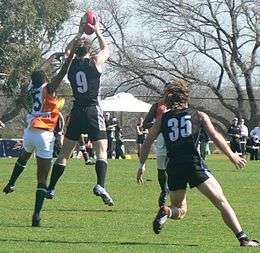 New Zealand player takes a mark in a 2008 International Cup match | |
| Country | New Zealand |
| Governing body | New Zealand AFL |
| National team(s) | New Zealand |
| First played | 1871, Wellington |
| Registered players | 30,000[1] |
| Clubs | 19 |
Club competitions | |
Audience records | |
| Single match | 22,546 - 2013 St Kilda vs Sydney. Westpac Stadium, Wellington |
Australian rules football in New Zealand is a sport which has been rapidly growing in popularity.[2]
There are five Australian Football Leagues in New Zealand: Auckland (Auckland Australian Football League), Canterbury (Canterbury Australian Football League), Wellington (Wellington AFL), Waikato (Waikato AFL) and Otago. 2016 saw the introduction of a four-team national competition played at the North Harbour stadium.
Sixteen New Zealanders have played in the Australian Football League. Several more are descendants of Māori and European New Zealanders.[3][4] Wellington hosted the first AFL game outside of Australia and the first AFL game in New Zealand in 2013, between the Sydney Swans and St Kilda.[5] Wellington hosted the second AFL game in New Zealand in 2014: Brisbane Lions and St Kilda played on Anzac Day.[6]
History of Australian rules football in New Zealand
Beginnings
The Christchurch Football club, founded in 1863,[7] played football according to its own rules,[8] one of which was to bounce the ball every 4 yards, very similar to the modern game of Australian Football. The club adopted rugby rules in 1876.[7][9]
Australian Football was introduced to New Zealand around 1868. The Nelson Football Club was formed this year and played a hybrid version of Victorian and Association (soccer) rules in its first two seasons.[10][11][12] By the 1860s, there was regular trade between New Zealand ports and Melbourne, and the Victorian (or Melbourne) rules would have been known by some of the immigrants.[13] The Nelson Club was the first club in New Zealand to adopt Rugby rules, in 1870.[14]
The Wellington Football Club was formed on 12 May 1871.[15] The club initially adopted Melbourne rules, but it soon switched to Rugby rules "principally for the reason that the clubs in adjoining provinces play under those rules, and as the club contemplate playing a match with the Nelson club before long the necessity of such a course is apparent." The last match played under Melbourne rules was on 24 June 1871.[16] This was not the end of the matter, however, with the club for a short period in 1875 adding the Melbourne rule of bouncing the ball. The club reverted to full Rugby rules soon thereafter.[17]
The Dunedin Football Club, formed in 1872, initially played under its own rules. Shortly thereafter, a second club in Dunedin, the Union Club, was formed; it is thought to have adopted Victorian rules. Poor weather meant that few games were played in both the 1873 and 1874 seasons. The Dunedin Club adopted Association (soccer) rules in 1875, while the Union club retained Victorian rules.[18] The clubs were able to compromise, and the first match between the clubs that year was played under Victorian rules on 19 June 1875.[19] The return match was played under Association rules a few weeks later. In 1876, a hybrid match was played between the two clubs. The first half was played according to rugby rules, and the second half according to Victorian Rules.[20] By 1877, both clubs had adopted Rugby rules.[18]
"At the annual meeting of the Union Club in 1877 it was decided by 17 votes to five to adopt the Rugby Union Laws, the club in all its matches with the D.F.C. previous to that date having stipulated for one spell of every game being under Victorian rules."[21]
The first games of football in Auckland were played in 1870 with the rules being a mix of Victorian and Association. In 1873, the Auckland Football Club adopted Rugby rules following a visit by two members of the Wellington Club.[12] At the 1874 AGM of the Auckland Football Club, discussion continued around rules, with motions put to either adopt the Victorian Rules of 1866, or form a committee to consider other rules. These motions were defeated in favour of continuing with Rugby rules.[22]
An Auckland team undertook the first inter-provincial Rugby tour in late 1875. This sparked additional interest in Rugby in regions such as Canterbury and Dunedin where several codes were being played. Ultimately, the success of this led to further representative tours, and proved to be a catalyst for Rugby to become the dominant code in the main regions.[12][18]
Brief Revivals
The Reform Football Club was formed in Wellington in 1879 to "play under the Victorian rules".[23] In the same article, several clubs are also reported to have been formed in Dunedin as well as one in Nelson. The Reform club's first practice match was held in the Hon. J. Sheehan's paddock, Hobson St, on 5 April 1879 in front of a "considerable number of spectators".[23] The Reform club enjoyed a reasonable amount of press coverage throughout 1879. From 1880, there is very little mention of the club, and how long it was in existence is unknown.[24]
The 1888-1889 New Zealand Native football team matches saw a Māori team visit Victoria, as part of a year long tour of the UK and Australia, to play a program of Victorian Rules games. The team played eight games, winning three and losing five. It defeated South Melbourne Football Club,[25] which at that stage was Victoria’s premier club.
New Century
After being virtually nonexistent since the 1880s, interest in Australian football was rekindled on the back of a wave of immigration from Australia in the first decade of the 20th century.[26] In 1903, the ‘New Zealand Association of Australian Football’ was formed in Christchurch by a committee of expat Victorians.[27] The league had 4 clubs (City Wanderers, Sydenham, Woolston, and Imperial with a fifth, Carlton, formed a year later). By 1904, a number of leagues were being established throughout the country. In Wellington, a league of five clubs was formed (City, Newtown, Petone, Wanderers, and Federal),[28] and Auckland had three clubs in the new league (Auckland Imperial, Victoria, and Austral football clubs).[29] Other centres also had clubs form in 1904, including Dunedin (Australian Pioneer Football Club[30]), Kaitangata (Wanderers[31]), Waihi and Waikino.
Additional clubs were to join the Auckland league in the following years, including the Eden Football Club, who won back-to-back Auckland Australian Football League premierships in 1907 & 1908.[32]
In 1905, two New Zealand representatives (one from the North Island and one from the South) attended the Australasian Football Conference where the Australasian Football Council was formed.[33]
In 1908, New Zealand defeated both New South Wales and Queensland at the Jubilee Australasian Football Carnival an event held in Melbourne, at the Melbourne Cricket Ground, to celebrate 50 years of Australian Football.[33]
Hiatus
Already in decline, the outbreak of World War I and the popularity of rugby union signalled a hiatus in the game in New Zealand. No clubs survived after the war.
New Zealand was no longer represented and without any overseas delegates, the council reverted to the Australian Football Council.
Nevertheless, some efforts were made to rekindle interest in the code during these years.
In 1961, the Melbourne Football Club toured New Zealand during its off season, becoming the first VFL/AFL club to do so.[34]
Modern Competition
In 1974, senior competitions began in Christchurch (The Canterbury Australian Rules Football Association),[35] Auckland (Auckland Australian Football League)[36] and Wellington.
In 1995, the competition had grown sufficiently strong to field a national team, the Falcons.
The Arafura Games gave the side the first opportunity to compete at an international level. In 1995, 1997 and 1999, New Zealand took the silver medal in Australian Football at the event in Darwin, Northern Territory, running second to Papua New Guinea.
In 1997, the New Zealand Australian Football Development Foundation (NZAFDF) was formed.
1998 saw the debut of New Zealand born Trent Croad into the Australian Football League, the beginnings of what is a successful career at elite level.
In 1999, NZAFDF incorporated as governing body and was renamed New Zealand AFL.
2016 saw the successful introduction of a high-level four-team national competition, featuring a national draft.
Exhibition Matches
The years of 1991, 1998, 2000 and 2001 saw official Australian Football League exhibition matches staged in New Zealand so that the AFL could gauge local support.
International Success
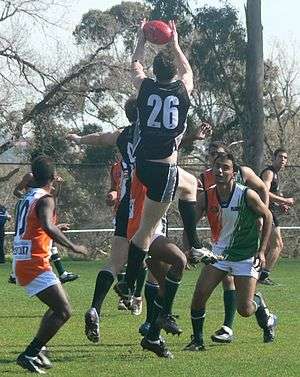
In the inaugural Australian Football International Cup in 2002, New Zealand finished 3rd.
In 2003, local Aussie Rules convert Nick Evans debuted for the famous All Blacks rugby union side against England.[37]
Since 2004, there have been talks of a New Zealand Australian Football League franchise or club relocation as a possible expansion plan for the league. New Zealand fields teams in several Australian competitions in other football codes including the National Rugby League and A-League.
The country came to be regarded as an Australian state by the Australian Football League's international development department.
2005 was a huge year for Australian Football in New Zealand. The national team, the Falcons defeated Papua New Guinea to win the International Cup and were later invited to send a team to the Australian Country Championships.
2006 saw the first-ever live regular season AFL matches on television, which were shown by SKY Network Television.[38]
In November 2008, 17-year-old Liam Ackland was invited to the AIS/AFL academy.[39]
The Hawthorn Football Club, which had been involved in New Zealand since about 2004 and at one point in 2009 had 3 players from New Zealand on its senior list,[40] stepped up its involvement in 2009 with development funding to set up a school competition, the "Hawks Cup", for recruiting and talent identification.[41] The sport boomed at junior levels after approved by the New Zealand Secondary Sports Council.[42] Kurt Heatherley of Tauranga accepted an AFL scholarship in 2010.[40]
Participation

The New Zealand AFL currently has around 600 senior players.[43] In 2010, the AFL hoped to increase registered secondary school participants with the introduction of in-school programs.[42] This introduction was highly successful and at the end of 2012, 25,000 Kiwikick participants had been recorded.
By 2016 the number of registered participants had increased to 35,000.
Leagues & Competitions
- Auckland Australian Football League
- Canterbury Australian Football League
- Waikato AFL
- Wellington AFL
- Otago AFL
2016 Four team national competition created.
National team
The national team is the Falcons. The Falcons were Silver medallists in the Arafura Games in 1995 and 1997, runners up in the Australian Football International Cup in 2002, then became International Cup champions in 2005.
AFL games
AFL club St Kilda signed an historic agreement with, the AFL and Wellington City Council, the Saints will play in New Zealand on Anzac Day each year from 2013 through 2015.[44] They play for the Simpson-Henderson Trophy.
| Round/Date | Host | Score | Guest | Score | Winner and Margin | Venue | Attendance |
| April 25, 2013 | St Kilda | 9.9 (63) | Sydney | 11.13 (79) | Sydney by 16 points | Westpac Stadium, Wellington | 22,546 |
| April 25, 2014 | St Kilda | 11.13 (79) | Brisbane Lions | 12.10 (82) | Brisbane by 3 points | Westpac Stadium, Wellington | 13,409 |
| April 25, 2015 | St Kilda | 12.9 (81) | Carlton | 18.13 (121) | Carlton by 40 Points | Westpac Stadium, Wellington | 12,125 |
Source: Footy Wire
Audience
AFL Exhibition Matches
| Date/Year | Location | Stadium | Teams | Crowd |
|---|---|---|---|---|
| 5/10/1991 | Auckland | Geelong v. St Kilda | 8,500 | |
| 1/03/1998 | Wellington | Basin Reserve | Melbourne v. Sydney | 7,820 |
| 29/01/2000 | Wellington | Westpac Stadium | Western Bulldogs v. Hawthorn | 11,666 |
| 2001 | Wellington | Westpac Stadium | Brisbane Lions v. Adelaide | 7,500 |
Television
- SKY Network Television (one delayed AFL match per week and Highlights)
- Sommet Sports (six live games each week, the remaining matches broadcast on delayed coverage)[45]
Notable New Zealand players
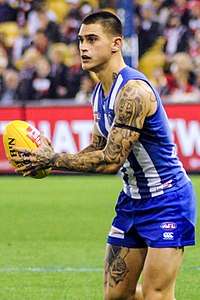 Marley Williams playing for North Melbourne in 2017
Marley Williams playing for North Melbourne in 2017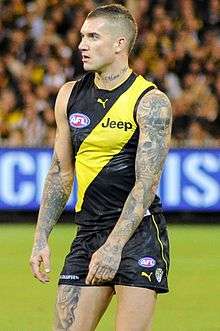 Dustin Martin, Richmond Brownlow medallist and premiership player in 2017
Dustin Martin, Richmond Brownlow medallist and premiership player in 2017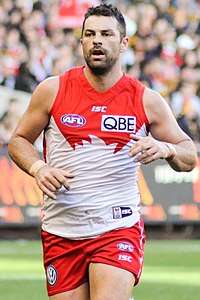 Heath Grundy, Sydney Swans premiership player in 2017
Heath Grundy, Sydney Swans premiership player in 2017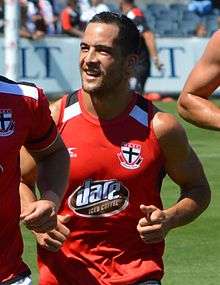 Shane Savage of St Kilda in 2017
Shane Savage of St Kilda in 2017.jpg) Max Gawn of the Melbourne Football Club in 2017
Max Gawn of the Melbourne Football Club in 2017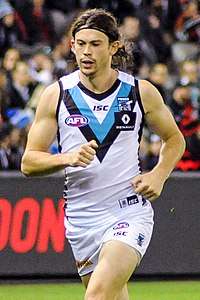 Jasper Pittard playing for Port Adelaide in 2017
Jasper Pittard playing for Port Adelaide in 2017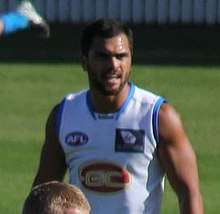 Karmichael Hunt playing for the Gold Coast in 2012
Karmichael Hunt playing for the Gold Coast in 2012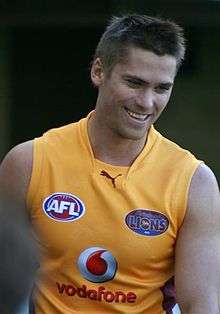 Simon Black, Brisbane Brownlow medallist and 3 time premiership player in 2008
Simon Black, Brisbane Brownlow medallist and 3 time premiership player in 2008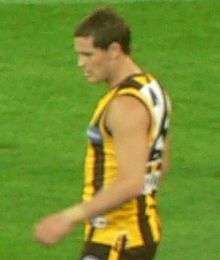 Trent Croad, Hawthorn premiership player in 2008
Trent Croad, Hawthorn premiership player in 2008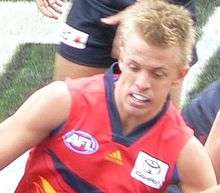 Nathan Van Berlo playing for Adelaide in 2007
Nathan Van Berlo playing for Adelaide in 2007.jpg) Brett Peake playing for Fremantle in 2006
Brett Peake playing for Fremantle in 2006
| Currently on an AFL senior list |
| Player | VFL/AFL Years* | VFL/AFL Matches* | Connections to New Zealand, References |
|---|---|---|---|
| Dustin Martin | 2010– | 178 | Father (Maori)[46] |
| Ben Rutten | 2003–2014 | 229 | Mother[47] |
| Jasper Pittard | 2011– | 115 | Mother[47] |
| Daniel Pearce | 2012–2015 | 6 | Father[47] |
| Marley Williams | 2012– | 81 | Father (Maori)[47] |
| Nathan Van Berlo | 2005–2016 | 182 | Both parents[48] |
| Karmichael Hunt | 2011–2014 | 44 | Born Auckland, father from Cook Islands, mother from Samoa[49] |
| Shane Savage | 2009- | 56 | Born; Maori father[50][51] |
| Brent Renouf | 2008-2014 | 68 | Born, both parents[51][52] |
| Heath Grundy | 2006- | 139 | Mother[53] |
| Aaron Edwards | 2003-2014 | 91 | Father, Samoan mother[54] |
| Simon Black | 1998–2013 | 322 | Father (born)[47] |
| Paul Bower | 2006–2012 | 70 | Maori mother[55] |
| Brett Peake | 2005-2012 | 118 | Maori[55] |
| Brian Peake | - | 66 | Maori[55] |
| Kurt Heatherley | - | 0 | Born Tauranga[56] (international rookie) |
| Jay van Berlo | 2009–2012 | 32 | Both parents[48] |
| Jordan Russell[47] | 2005–2013 | 125 | Mother[48] |
| Adam Campbell | 2006–2009 | 13 | Born Christchurch, Parents[57] |
| Trent Croad | 1998–2009 | 222 | Born, Parents[58] |
| Daniel McAlister | 1997–2002 | 6 | Born, part Maori[55] |
| Danny Dickfos | 1996–1999 | 65 | Part Maori[59] |
| Donald Dickie | 1996–2000 | 55 | Born, part Maori |
| Wayne Schwass | 1988–2002 | 282 | Born, part Maori[60] |
| Warren Jones | 1978–1988 | 123 | Born |
| Peter Bennett | 1944–1954 | 103 | Born |
| Marty McDonnell | 1939–1950 | 92 | Born |
| Thomas O'Halloran | 1925–1934 | 142 | Born |
| Joe Sellwood | 1930–1945 | 181 | Born |
| Harry Haughton | 1912-19 | 113 | Born |
| Greg Broughton | 2009-2015 | 110 | Father (Maori) [61] |
| Max Gawn | 2010– | 74 | Raised in Greymouth[62][63] |
| Beau Maister | 2005-2014 | 44 | Mother from Christchurch[64] |
- as of 2017 AFL season
See also
References
- ↑ Herald Sun - New Zealand AFL CEO Rob Vanstam says there is growing interest in the game across the Tasman
- ↑ NZ coverage reaches new heights
- ↑ AFL players with international backgrounds#New Zealand
- ↑ stuff.co.nz - Heatherley waiting for word on his AFL future
- ↑ stuff.co.nz - AFL confirmed for capital next year
- ↑ St Kilda v Brisbane Lions - AFL.com
- 1 2 Christchurch Football Club - Club History
- ↑ RUGBY UNION FOOTBALL - HISTORY - 1966 Encyclopaedia of New Zealand
- ↑ Mosley, M. (1885), Illustrated Guide to Christchurch and Neighbourhood, J. T. Smith & Co., p. 120
- ↑ Swan, Arthur C. (1948). History of New Zealand Rugby Football, Vol. 1, 1870-1945.
- ↑ "Early Rugby in the Manawatu - Talk" Clive Akers, 10 April 2008
- 1 2 3 Camilla Obel, "Unions, Leagues and Franchises: The Social Organisation of Rugby Union in New Zealand", University of Canterbury thesis, 2001
- ↑ Blainey, Geoffrey (2003), A game of our own: the origins of Australian football, Black Inc, p. 142
- ↑ Turley, A. (2009). Rugby-The Pioneer Years, How Rugby Captured the Heart of a Nation, Auckland, N.Z.: Harper Collins.
- ↑ Wellington Independent, 12 May 1871
- ↑ Wellington Independent, 24 June 1871
- ↑ Evening Post 3 May 1875 & 12 May 1875
- 1 2 3 Rex W. Thomson, "Provincial Rugby in New Zealand: Otago's Academic Pioneers", Fall 1996
- ↑ Otago Witness, 26 June 1875
- ↑ "When 'Rules' ruled Sydney". Australian Broadcasting Corporation. 19 March 2008.
- ↑ Otago Witness, 6 June 1889, Page 26
- ↑ Daily Southern Cross, 2 May 1874.
- 1 2 Evening Post, 7 April 1879
- ↑ Papers Past
- ↑ Ryan, Greg (1993). Forerunners of the All Blacks. Christchurch, New Zealand: Canterbury University Press. p. 144. ISBN 0-908812-30-2.
- ↑ Jock Phillips. 'History of immigration - Migration: 1900 to 1914', Te Ara - the Encyclopedia of New Zealand, updated 12 June 2013
- ↑ Otago Witness, 1 April 1903, Page 50
- ↑ Evening Post, 3 June 1904 and 22 June 1904
- ↑ New Zealand Herald, 14 May 1904
- ↑ Otago Witness, 11 May 1904, page 53
- ↑ Bruce Herald, 7 June 1904, Page 5
- ↑ Auckland Australian Football League Archived 24 July 2011 at the Wayback Machine.
- 1 2 A False Dawn
- ↑ Melbourne in AFL first
- ↑ http://www.sportingpulse.com/assoc_page.cgi?c=1-4739-0-0-0&sID=58255
- ↑ "Archived copy". Archived from the original on 14 October 2008. Retrieved 2009-08-08.
- ↑ All Black almost a Swan fromm news.com.au
- ↑ World Footy News - Live footy telecasts for New Zealand
- ↑ International juniors head for AIS and Junior Oceania Cup
- 1 2 HANZ-UP! AFL Program Archived 23 May 2010 at the Wayback Machine. hawthornfc.com.au
- ↑ Hawks cast recruiting net across Tasman from the Herald Sun
- 1 2 Rushworth, Anna (29 November 2009). "Aussies luring Kiwi kids into kicking and jumping game". The New Zealand Herald. Retrieved 17 September 2011.
- ↑ AFL International Census 2007 Archived 24 May 2011 at the Wayback Machine.
- ↑ "Archived copy". Archived from the original on 6 November 2013. Retrieved 2013-11-13.
- ↑ Sommet Sports broadcasting on Sky Sports
- ↑ Langmaid, Aaron (30 June 2010). "Dustin Martin and father go neck and neck in Maori stakes". Courier Mail. Retrieved 1 October 2017.
- 1 2 3 4 5 6 118 players with multicultural background on AFL lists
- 1 2 3 An old head on young shoulders
- ↑ Masters, Roy (1 August 2009). "Hunt and the hunted: AFL targets NRL's monopoly on islanders". The Sydney Morning Herald.
- ↑ 'Proud Kiwi' looks forward to homecoming
- 1 2 http://www.realfooty.com.au/news/news/forget-irish-clubs-turn-to-kiwis/2009/03/12/1236447397700.html
- ↑ McClure, Geoff (2 July 2008). "Kiwi Brent joins select club". The Age. Melbourne.
- ↑ Bidwell, Hamish (23 April 2013). "Swans hope to win over a few Kiwis".
- ↑ Making his mark
- 1 2 3 4 The Footy Almanac - Asia-Pacific Team of the Century
- ↑ http://www.worldfootynews.com/article.php/20091113132701824
- ↑ http://www.worldfootynews.com/staticpages/index.php/International_Players_in_Australia
- ↑ All Blacks tackle Waverley Park
- ↑ Losing Hayne would be disaster DANIEL LANE for the Sydney Morning Herald 6 June, 2010M
- ↑ Māori overseas - Retaining Māori culture in Australia - Te Ara Encyclopedia of New Zealand
- ↑ Broughton looks forward
- ↑ "If Aussies Win then Max's Shirt is 'Gawn'". AFL Players Association. 24 March 2015. Retrieved 23 April 2010.
- ↑ Flanagan, Martin (18 March 2016). "Big Max a true Demon believer". The Age. Fairfax Media. Retrieved 23 April 2010.
- ↑ Beau Maister - Heritage Team Acceptance